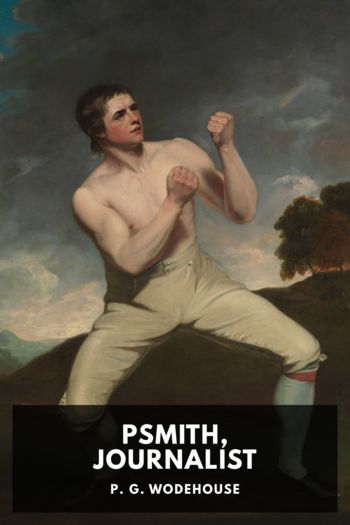Psmith in the City by P. G. Wodehouse (world of reading txt) 📕

- Author: P. G. Wodehouse
Book online «Psmith in the City by P. G. Wodehouse (world of reading txt) 📕». Author P. G. Wodehouse
At a quarter to six the professional left, caught at very silly point for eight. The score was a hundred and fifteen, of which Mike had made eighty-five.
A lengthy young man with yellow hair, who had done some good fast bowling for the Hall during the week, was the next man in. In previous matches he had hit furiously at everything, and against the Green Jackets had knocked up forty in twenty minutes while Mike was putting the finishing touches to his century. Now, however, with his host’s warning ringing in his ears, he adopted the unspectacular, or Bagley, style of play. His manner of dealing with the ball was that of one playing croquet. He patted it gingerly back to the bowler when it was straight, and left it icily alone when it was off the wicket. Mike, still in the brilliant vein, clumped a half-volley past point to the boundary, and with highly scientific late cuts and glides brought his score to ninety-eight. With Mike’s score at this, the total at a hundred and thirty, and the hands of the clock at five minutes to six, the yellow-haired croquet exponent fell, as Bagley had fallen, a victim to silly point, the ball being the last of the over.
Mr. Smith, who always went in last for his side, and who so far had not received a single ball during the week, was down the pavilion steps and halfway to the wicket before the retiring batsman had taken half a dozen steps.
“Last over,” said the wicket-keeper to Mike. “Any idea how many you’ve got? You must be near your century, I should think.”
“Ninety-eight,” said Mike. He always counted his runs.
“By Jove, as near as that? This is something like a finish.”
Mike left the first ball alone, and the second. They were too wide of the off-stump to be hit at safely. Then he felt a thrill as the third ball left the bowler’s hand. It was a long-hop. He faced square to pull it.
And at that moment Mr. John Bickersdyke walked into his life across the bowling-screen.
He crossed the bowler’s arm just before the ball pitched. Mike lost sight of it for a fraction of a second, and hit wildly. The next moment his leg stump was askew; and the Hall had lost the match.
“I’m sorry,” he said to Mr. Smith. “Some silly idiot walked across the screen just as the ball was bowled.”
“What!” shouted Mr. Smith. “Who was the fool who walked behind the bowler’s arm?” he yelled appealingly to Space.
“Here he comes, whoever he is,” said Mike.
A short, stout man in a straw hat and a flannel suit was walking towards them. As he came nearer Mike saw that he had a hard, thin-lipped mouth, half-hidden by a rather ragged moustache, and that behind a pair of gold spectacles were two pale and slightly protruding eyes, which, like his mouth, looked hard.
“How are you, Smith,” he said.
“Hullo, Bickersdyke.” There was a slight internal struggle, and then Mr. Smith ceased to be the cricketer and became the host. He chatted amiably to the newcomer.
“You lost the game, I suppose,” said Mr. Bickersdyke.
The cricketer in Mr. Smith came to the top again, blended now, however, with the host. He was annoyed, but restrained in his annoyance.
“I say, Bickersdyke, you know, my dear fellow,” he said complainingly, “you shouldn’t have walked across the screen. You put Jackson off, and made him get bowled.”
“The screen?”
“That curious white object,” said Mike. “It is not put up merely as an ornament. There’s a sort of rough idea of giving the batsman a chance of seeing the ball, as well. It’s a great help to him when people come charging across it just as the bowler bowls.”
Mr. Bickersdyke turned a slightly deeper shade of purple, and was about to reply, when what sporting reporters call “the veritable ovation” began.
Quite a large crowd had been watching the game, and they expressed their approval of Mike’s performance.
There is only one thing for a batsman to do on these occasions. Mike ran into the pavilion, leaving Mr. Bickersdyke standing.
II Mike Hears Bad NewsIt seemed to Mike, when he got home, that there was a touch of gloom in the air. His sisters were as glad to see him as ever. There was a good deal of rejoicing going on among the female Jacksons because Joe had scored his first double century in first-class cricket. Double centuries are too common, nowadays, for the papers to take much notice of them; but, still, it is not everybody who can make them, and the occasion was one to be marked. Mike had read the news in the evening paper in the train, and had sent his brother a wire from the station, congratulating him. He had wondered whether he himself would ever achieve the feat in first-class cricket. He did not see why he should not. He looked forward through a long vista of years of county cricket. He had a birth qualification for the county in which Mr. Smith had settled, and he had played for it once already at the beginning of the holidays. His debut had not been sensational, but





Comments (0)